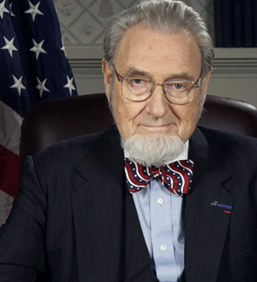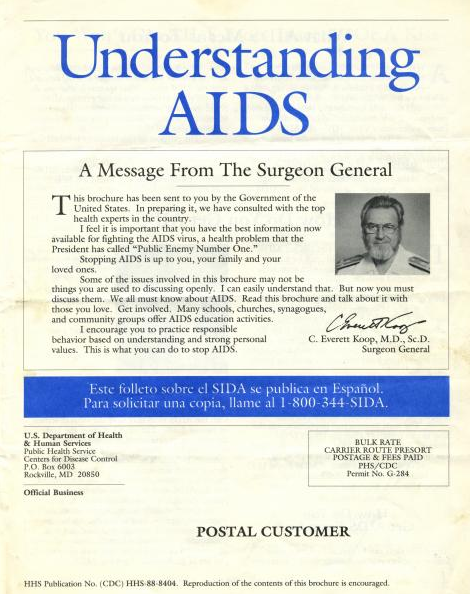C. Everett Koop, former Surgeon General of the United States, has passed away. He was 96 years old. The devout, conservative, evangelical Christian born the grandchild of German immigrants was one of the great pragmatist of the past few generations, proving that a fact-based, rational approach to life can improve standard of living, reduce disease, and change public policy. Prior to taking public office, he was a pediatric surgeon focused on saving the lives of young children.
 I cannot overstate my respect and admiration for this man. If you want to think clearer, and be more effective, study his life. He made good decision after good decision and millions of people were saved because of his actions. He found a way to work with people with whom he didn’t agree about various topics. He was strong in the face of powerful, well-funded corporate lobbyists. There is so much here to appreciate.
I cannot overstate my respect and admiration for this man. If you want to think clearer, and be more effective, study his life. He made good decision after good decision and millions of people were saved because of his actions. He found a way to work with people with whom he didn’t agree about various topics. He was strong in the face of powerful, well-funded corporate lobbyists. There is so much here to appreciate.
Above all, Dr. Koop promoted a doctrine of life. His two greatest accomplishments:
- The Battle Against Tobacco, and
- The Battle Against AIDs.
We’ll look at each briefly to see how his independence of thought made such a difference.
The Battle Against AIDs
Dr. Koop was working under President Ronald Reagan as the Surgeon General of the United States, a post he held from 1982 through 1989, when the greatest health threat since Small Pox made its way onto the world stage: The HIV virus.
[mainbodyad]Today, we know what it is because the virus has practically decimated the entire continent of Africa, reducing lifespans to as low as 35 years old in some countries and infecting nearly 1 out of 2 citizens in others. We’ve seen the financial, human, scientific, and political cost of the tiny genetic invader and how it reshaped the globe over the past thirty years.
Upon reviewing the then-nascent evidence of this deadly upstart, and realizing that HIV was spread primarily through drug use and sexual contact, Dr. Koop analyzed the decision trees with one variable in mind: How do we, as a nation, reduce the total number of infections and decrease suffering and death?
He was not interested in popularity.
He was not interested in political correctness.
He was interested in saving lives.
With that as his goal, he came to the conclusion that despite his own, personal moral conviction that sex should be saved until marriage and that people should enter solely into a lifelong, heterosexual, monogamous marriage blessed by God, the most effective method of prevention was widespread distributions of condoms, as well as graphic, detailed sexual health education to explain to people what was causing the virus, how the virus spread, and how you could reduce your chances of contracting the virus.
While others screamed about “encouraging” kids to have premarital sex, he had only one objective: To make sure those very same parents never had to hold their child, emaciated in a hospital bed, gasping for breath as death approached.
He vowed, “I will use the written word, the spoken word and whatever I can in the electronic media to deliver health messages to this country as long as people will listen.” Despite screams from his own friends, family, and neighbors, he mailed an information flyer to every American household called Understanding AIDs. He wrote that he understood the topic was uncomfortable; that it would require conversations about areas of personal conduct that people considered inappropriate, but too bad. We have to do it as a nation because people are dying and if we could do something to reduce the number of folks who suffered this horrific death, we have a moral obligation to do so.

The Battle Against the Tobacco Lobby
Dr. Koop also saw the enormous health risks, and health care burden, caused by tobacco use. He took on multi-billion dollar companies with powerful lobbyists and worked to put in place policies and education programs that would cause smoking to someday be virtually impossible in the United States.
[mainbodyad]The dividends of his crusade are now evident thanks to the efforts of those who came after him. When I grew up, you could walk up to a cigarette vending machine, put in a few quarters, and pull a lever to see a pack of smokes fall to the bottom. Now, tobacco is held behind counters at stores and requires identification to be shown. Tobacco companies can’t advertise to kids. Many municipalities and cities have banned smoking due to the risks of second hand smoke. Pregnant women are warned, in large, bold labels, that their smoking puts their child at risk.
As with the AIDs fight, Dr. Koop didn’t care who he angered, nor how powerful they were. He also didn’t force anyone to do anything, but rather worked to persuade people with reason and facts. He focused on his mission of saving lives and reducing suffering. He was vocal about the fact that politicians wouldn’t face up to the problems tobacco caused because they were being bought by the tobacco money.
What You Can Learn from Dr. Koop
For me, the lessons I learned from studying C. Everett Koop’s life include:
- Be a living, walking example of your values. Talk is cheap. Actions count.
- Do what works, even if it is not popular and your friends and family
- Speak up when something is happening and you can make the world better, even if your enemies are more powerful.
- Moral persuasion is superior to forcing behavior changes. You cannot make a man live better, but you can show him a better way. These changes are more likely to be permanent.
- Never refuse to confront what needs to be discussed due to fear or discomfort. All discomfort in communication is based on fear. Fear in speech is based on rejection, humiliation, or the fear of death. Refusing to acknowledge something does not make it go away. In many cases, it makes it worse.
- Facts and rationality must always win when creating policy. It doesn’t matter what you want to believe; you have to go with the data, just as a pilot must learn to trust his instruments, not his eyesight.
- Leave a legacy of serving others
Dr. Koop’s life was an enormous success.


